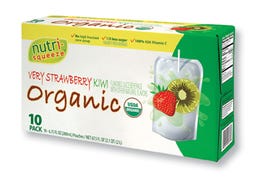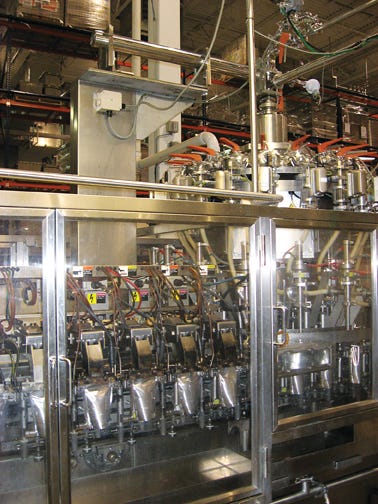|
|
This is the second part of the Faribault Foods story. Part one, which ran last month, covered a first-of-its-kind cartoner that packs 10 standup pouches in a unique paperboard wrap-around carton.
Advanced Nutritionals Corp. started in 1992 as a manufacturer of sport drinks. In 2001, the company changed its name to SoftPac Industries, Inc., and built a $12-million plant in Elk River, MN to produce juice drinks in standup pouches to compete with Kraft's Capri Sun 10-percent juice products. The plant was bought by contract-packing giant Faribault Foods in 2005, and with three high-speed fillers running 300 pouches/min each, it is the largest private-label packager of 10-percent juice in standup pouches in the country. Its customers include top national retailers, including leading grocery chains, mass merchandisers and specialty outlets. As the company has continued to expand and grow, it has moved beyond 10-percent juice products into 100-percent juice and organic beverages. It also markets some pouches under its own brand name.
 “We're built for speed, and our base line is a 200-milliliter, standup, foil-laminated pouch,” says plant manager John Anderson. “We've designed this plant around the hot-fill product and the package. Within that package, customers have their choice of their own product formulation and customized pouch and carton graphics.”
“We're built for speed, and our base line is a 200-milliliter, standup, foil-laminated pouch,” says plant manager John Anderson. “We've designed this plant around the hot-fill product and the package. Within that package, customers have their choice of their own product formulation and customized pouch and carton graphics.”
Three pouch filler/sealers
Faribault makes its own pouches from film (this operation is covered in the accompanying sidebar). The plant has three Model TL-AX4 continuous-motion, horizontal fill/seal machines from Toyo Jidoki Co., Ltd. (www.tyj.co.jp) that run 250 pouches/min each. The preformed pouches from the pouchmaking operation are delivered to the filler/sealers in boxes, and the operator for each machine picks the flat pouches out of a box and fans them out onto four infeed conveyors that deliver the pouches to the form/seal machines. These conveyors, as well as all of the other conveyors in the plant, were supplied by Span Tech LLC (www.spantechllc.com).
Vacuum cups transfer four pouches simultaneously to continuous-moving grippers that push the sides of the pouches together to open them. The grippers transport the pouches through all subsequent operations of the machine. Sensors check the pouches at this point; if a pouch has failed to transfer properly, for example, or if it is too low or too high, or if the top is not open, the grippers open and the pouch is air-blown into a bin.
After passing a laser printer from Domino Amjet, Inc. (www.dominoamjet.com), that applies a lot code and date to the back of the pouch, the pouches enter the rotary filler, where they are filled with 200 mL of product. In this process, the product is pumped into a tank on top of the filler/sealer, and air pressure forces it to the TL-AX4's 18 fill nozzles, each of which has a dedicated flow meter. As the pouches travel around the rotary filling zone, the fill nozzles descend into the pouches and travel with the pouches as the product is filled. The fill nozzles then rise out of the pouches, and the pouches go through two sealing cycles in which heated jaws come together followed by cooling jaws. At the final station in the machine, the grippers release the pouches, four at a time. The pouches then drop down chutes onto individual conveyors. “These fillers are extremely accurate, and the leaker rates are remarkable,” says Anderson. “We worked very closely with Toyo Jidoki on the development of these machines for our operation. They did a fantastic job of standing behind their machines and working with us on improvements on each additional machine that we installed.”
Shrink bundle tightly
The conveyors from the filler converge into two conveyors that transport the pouches to a spiral cooler from FMC Foodtech (www.fmctechnolgies.com) that cools them from the filling temperature. Pouches leaving the cooler are lifted up to the second floor, where the plant has installed four Dynac four-level accumulators from Hartness Intl., Inc. (www.hartness.com) that provide two minutes of accumulation each. From the accumulators, the pouches go either to the Mead Westvaco (www.meadwestvaco.com) cartoner that PD wrote about last month or to an older cartoner from Blueprint Automation (www.blueprintautomation.com).
Cartons from the MeadWestvaco cartoner are conveyed to a SpiraVeyor spiral conveyor made by AmbaFlex, Inc. (www.ambaflex.com) that carries them down to the first floor. After the cartons leave the spiral conveyor, they pass over an Alpha checkweigher from All-Fill, Inc. (www.all-fill.com). This unit incorporates three weight zones: under, accept and over, and out-of-spec pouches are rejected as they leave the checkweigher. The electronic control system for the checkweigher includes an alphanumeric liquid crystal display plus an individual light-emitting diode weight display, up to 25 programmable product setups, sample and hold display functions, automatic setup of static and dynamic calibration, and startup and dynamic self-diagnosis with error messages. The unit's standard statistical data package looks at the last group of 50 packages, and calculates long-term average-weight data and standard deviation.
The cartoners are then conveyed to a Tight Wrap® inline shrink bundler from EDL Packaging Engineers, Inc. (www.edlpackaging.com) that wraps four or five cartons in plastic film. This machine incorporates EDL's patented technology that bundles the cartons so tightly in low-density polyethylene film that it essentially requires no heat to shrink the film. The heat tunnel is used mainly to shrink the edges of the film to achieve a bull's eye on the sides of the package. The machine uses two rolls of film mounted above and below the conveyor.
In this operation, cartons are separated into groups of four or five as they enter the machine. Four flight bars on a continuous rectangular chain transfer the cartons through the system. The group of cartons enters the flight-bar area on a conveyor, and then travels under one of the flight bars and into the film web. When the group is sensed clear of the flight-bar path, the bar rotates, pulling the top film down and around the rear of the group. The flight bar pushes the group into the sealing position, while pulling film from the top and bottom film reservoirs. In this operation, a flight bar pulls the film from the top roll against the back of the four or five assembled cartons as it pushes the cartons into the machine. When the cartons are in the machine, another flight bar ahead of the cartons travels down and pushes the top film, which has been pulled over the cartons by the previous set of cartons, against the film from the bottom roll, which is pulled beneath the cartons. The hot-seal jaw then rises up against the flight bar and seals the top and bottom layers of film together, while simultaneously cutting the film web in the center of the seal. A unique feature of the EDL bundler is that the film is tensioned and sealed very close to the rear of the package, thus it achieves a very tight wrap. The bundles then travel through the heat tunnel to seal the edges of the film on the sides of the bundles.
The bundles of cartons are conveyed to a robotic palletizer from ABB, Inc. (www.abb.com/robotics).
More information is available: |
ABB, Inc., 888/785-3904. www.abb.com/robotics. |
All-Fill, Inc., 610/524-7350. www.all-fill.com. |
AmbaFlex, Inc., 877/800-1634. www.ambaflex.com. |
Blueprint Automation, 804/520-5400. www.blueprintautomation.com. |
Domino Amjet, Inc., 847/244-2501. www.dominoamjet.com. |
EDL Packaging Engineers, Inc., 920/336-7744. www.edlpackaging.com. |
FMC FoodTech, 312/861-6000. www.fmctechnologies.com. |
Hartness Intl., Inc., 864/297-1200. www.hartness.com. |
Mead Westvaco Corp., 404/897-6564. www.meadwestvaco.com. |
Sonoco Products Co., 800/377-2692. www.sonoco.com. |
Span Tech LLC, 270/651-9166. www.spantechllc.com |
Toyo Jidoki Co., Ltd., 03-5447-2596. www.tyj.co.jp. |
About the Author(s)
You May Also Like



